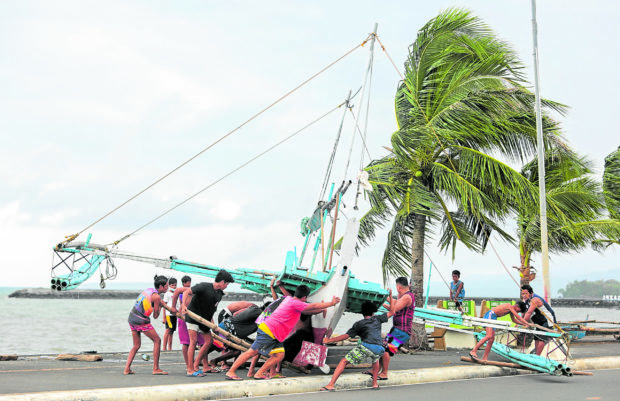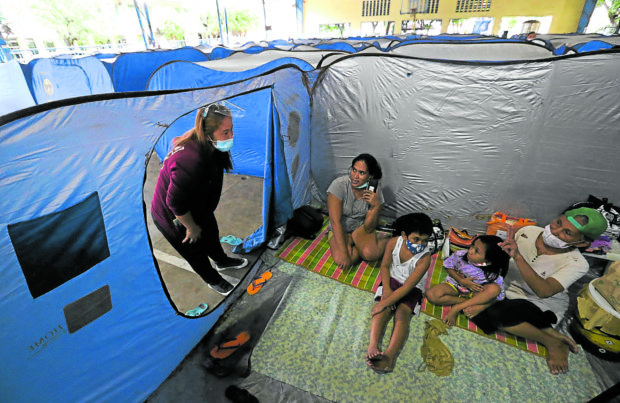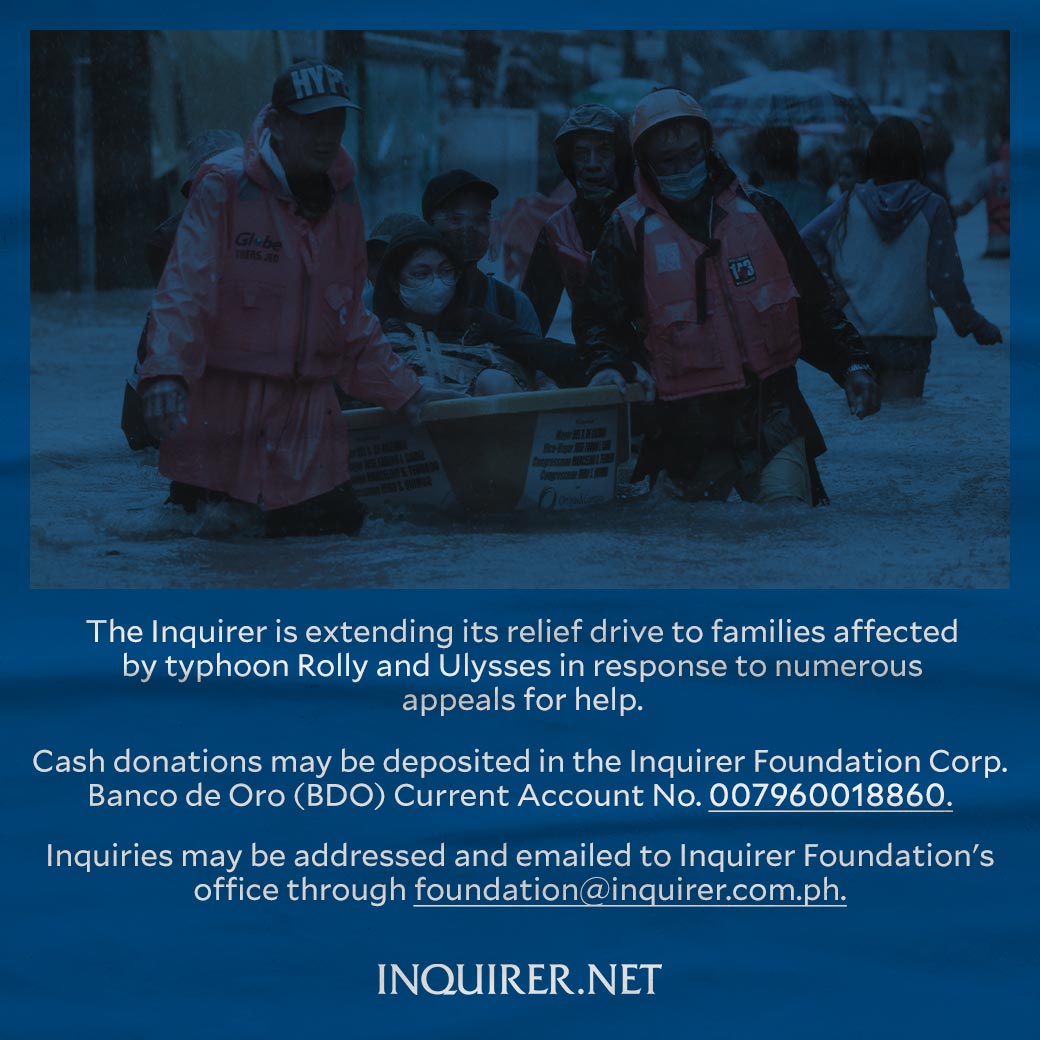DOH stresses COVID-19 curbs as 1 million people pack storm shelters
Authorities on Saturday evacuated nearly 1 million people in the path of the world’s strongest typhoon this year and health officials reminded the public to maintain pandemic safety measures despite being crammed in storm shelters.
Typhoon Rolly (international name: Goni) was raging toward southern Luzon at 25 kilometers per hour, packing sustained winds of 215 kph and gusts of up to 265 kph. It was about 345 km east northeast of Virac, Catanduanes, around 4 p.m. on Saturday.
The Philippine Atmospheric, Geophysical and Astronomical Services Administration (Pagasa) said the typhoon was forecast to hit Catanduanes and the Camarines provinces on Sunday morning and then barrel through Quezon province.
As it moves toward the South China Sea to the west, it will bring heavy to intense rains accompanied by violent winds to Metro Manila, the Southern Tagalog region and Central Luzon, but will weaken after slamming into the Sierra Madre mountains.

ABOVE THE WATER A group of men raise a boat way above the water on the shores of Legazpi City on Saturday in preparation for Typhoon “Rolly,” (international name: Goni) which is expected to hit nearby Catanduanes province on Sunday with near supertyphoon strength that could generate over 3 meters of storm surges. —MARK ALVIC ESPLANA
Monitor evacuees
Health Undersecretary Maria Rosario Vergeire urged local officials to deploy safety officers who would regularly monitor evacuees who may be crammed in enclosed and tight shelters, which are conducive to the transmission of the new coronavirus that causes COVID-19.
The safety officers will help ensure that evacuees comply with the minimum health standards—physical distancing, wearing masks and washing hands frequently—to prevent increasing the number of infections, she said.
Article continues after this advertisementThe safety officers will also regularly check COVID-19 symptoms among the evacuees, who will have to be isolated, Vergeire said.
Article continues after this advertisement“We are reminding everyone to be vigilant, aware and cautious. We know the risk when people congregate,” she said.
The National Disaster Risk Reduction and Management Council (NDRRMC) said nearly 1 million people had been evacuated by Saturday.
According to Undersecretary Ricardo Jalad, executive director of the NDRRMC, most of the evacuees were from the Bicol region where the Office of Civil Defense had prepared to evacuate 2.5 million people, or about 570,000 families, by early Sunday.

FLEEING ‘ROLLY’ AND POSSIBLE LAHAR Residents of Barangay Padang, Legazpi City, in Albay province head for an evacuation center on Saturday, as authorities warn not only against strong winds and storm surges but also deadly lahar flow from Mayon Volcano. In Metro Manila (top photo), a family has also taken shelter at an elementary school in Barangay Poblacion, Muntinlupa City, with a social worker checking on their condition. —MARK ALVIC ESPLANA/LYN RILLON
COVID-19 facilities
In Camarines Sur, the provincial government moved about 20,000 families before noon on Saturday.
Camarines Norte officials expected to evacuate at least 35,000 families, or 159,000 people.
In Albay, thousands from villages prone to floods, lahar, landslide and storm surges were evacuated, according to the Provincial Disaster Risk Reduction and Management Council.
Jalad said positive and suspected cases of COVID-19 in “mega” treatment facilities in Metro Manila and nearby Bulacan had been transferred to hospitals and hotels.
He said the tents where they were being housed on the grounds of the Philippine International Convention Center and the Philippine Arena Complex might not survive the typhoon’s winds.
Weather forecaster Ariel Rojas told reporters that the eyewall of the storm would be passing Sunday night or early Monday near Metro Manila, which will experience winds that are strong enough to break trees and damage houses made of light materials.
Pagasa also warned of moderate to high risk of storm surges. In the northern coastal areas of Quezon and Polillo Island, Catanduanes and the Camarines provinces, storm surges of over 3 meters are expected.
Palace: Stay calm
In coastal areas of Manila, Cavite, Bulacan, Pampanga, Bataan, southeastern Batangas and southwestern Quezon, the sea level could rise to up to 3 meters, it said.
Rojas said Rolly will likely not gain supertyphoon strength as it was already close to land.
Pagasa categorizes a storm with sustained winds of 220 kph and above as supertyphoon. Supertyphoon Yolanda (international name: Haiyan), which packed sustained winds of 235 kph and gusts of up to 275 kph when it made landfall in November 2013, left more than 6,000 dead and missing.
Sen. Bong Go said President Duterte was in Mindanao monitoring the typhoon and could quickly fly back to Manila anytime the weather permits.
Presidential spokesperson Harry Roque urged the public to monitor government weather bulletins and to “stay calm yet vigilant … and keep their family members and loved ones dry and safe.”
In Daet, capital of Camarines Norte, a 55-year-old member of a rescue group who wanted to be identified only as Dong, was busy securing the roof of his house on Saturday morning.
He remembers the devastation caused by Typhoon “Rosing” (international name: Angela) which tore through his town 25 years ago as one of the worst typhoons to hit the country since 1945.
Rosing caught them unprepared, Dong said. He had to walk for more than 3 kilometers across flooded streets and toppled trees to reach home after he was trapped in a shop that he was managing.

PRIZED POSSESSIONS A man secures his farm animals near Pinacanuan River at Baculod in Ilagan City, Isabela, as the province braces for “Rolly” on Saturday. —VILLAMOR VISAYA JR
Keeping animals safe
This time, Dong was not taking any chances and even secured three hens, 10 chicks and eight roosters he was keeping as pets in a room in his house to keep them safe.
“We are preparing because we are in the direct path of Rolly. Whether it is strong or weak, as long as you are in the path of the typhoon, you would really have to prepare,” he said.
Bishops Joel Baylon of Legazpi and Rolando Tria Tirona of Naga asked the faithful to pray for the people’s safety.
Santiago Mella, Daet’s disaster management officer, said the initial evacuation plan was to house one family per classroom but increased the number to three on Saturday because there were too many evacuees.
However, he said barriers would be installed to separate each family as a COVID-19 safety measure.
By late Saturday afternoon, streets in Legazpi City were deserted after small and large businesses were ordered closed by 4 p.m. by Albay Gov. Al Francis Bichara to allow residents to prepare for the typhoon. Shops in Albay will remain closed on Sunday.
Hundreds of residents packed department stores before they closed to buy provisions, particularly food and bottled water.
SM City Legazpi allowed owners of cars and motorcycles to leave their vehicles on its third level parking space free of charge to keep them safe from floodwaters, according to Claire Hariri, the mall’s spokesperson.
In Ligao City, also in Albay, farmers harvested their still to mature rice to save them from the expected floods, said farmer Analyn Parco.
In Nueva Ecija province, rice farmers were advised by the Department of Agriculture to harvest their crops that were 70 percent mature.
In Isabela province, farmer Rolly Nicolas, harvested his still young corn, which he would use to feed his cattle.
Other farmers in province, like Gloria Bartolome, herded cows and carabaos to higher ground away from a river that was swelling due to discharges from the Magat Dam.
—Reports from Nikka G. Valenzuela, Jovic Yee, Patricia Denise M. Chiu, Mar S. Arguelles, Rey Anthony Ostria, Michael Jaucian, Ma. April Mier-Manjares, Delfin Mallari Jr., Villamor Visayas Jr. and Armand Galang

